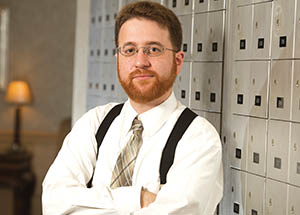Research to Assess Nondrug Psychosocial Approach for Adults with Autism
The University of Pittsburgh has received a $3.2 million grant from the National Institute of Mental Health to determine whether nondrug psychosocial treatments can improve the quality of life for adults with autism spectrum disorder.
It will be the largest study ever conducted to assess whether cognitive enhancement therapy and enriched supportive therapy can help adults with a complex disorder that influences how a person behaves, learns, communicates, and interacts with others. Currently, autism spectrum disorder affects one out of 68 children in the United States.
 The research program—called Perspectives—will take place at Pitt and will be led by Shaun Eack, Pitt’s David E. Epperson Associate Professor of Social Work and an associate professor of psychiatry, in collaboration with Nancy Minshew, a professor of psychiatry and neurology in Pitt’s School of Medicine and director of the University’s Center for Excellence in Autism Research.
The research program—called Perspectives—will take place at Pitt and will be led by Shaun Eack, Pitt’s David E. Epperson Associate Professor of Social Work and an associate professor of psychiatry, in collaboration with Nancy Minshew, a professor of psychiatry and neurology in Pitt’s School of Medicine and director of the University’s Center for Excellence in Autism Research.
The study will include 100 participants, ages 16-40, who will be randomly assigned to one of two psychotherapies for as many as 18 months.
The first, cognitive enhancement therapy, involves about three and a half hours a week of computer exercises in attention, memory, and problem solving, along with small group sessions in which participants learn how to act wisely in social situations by reading nonverbal cues, understanding another person’s perspective, and other aspects of successful social interaction.
The second, enriched supportive therapy, takes place for about an hour a week and is a one-on-one therapy to help adults learn about their condition, manage their emotions and stress, improve their social skills, and cope with everyday problems.
“The evidence base for treatment for adults with autism is almost nonexistent,” says Eack. “This study will establish whether cognitive enhancement therapy and enriched supportive therapy are effective for treating autism, which is essential for making more treatments available in the community for adults.”
“Ultimately, we hope the study will establish an evidence base for both cognitive enhancement therapy and enriched supportive therapy and also will tell us about the comparative benefits of both interventions in adults, about which we know very little,” he added.
The research team will collect neuroimaging data as well as data from interviews with clinicians and family members to assess if the therapies are working.
It is Eack’s hope that the therapies can also eventually be made available to the many children who have autism spectrum disorder who will continue to need help as they grow into adulthood. His earlier work revealed that cognitive enhancement therapy was very successful in patients with schizophrenia.
“Social work has a long history of developing psychosocial interventions for people with disabilities,” Eack said. “And we are working closely with Pitt’s experts in the Department of Psychiatry. This work could not be done without interdisciplinary collaborations.”
Other Stories From This Issue
On the Freedom Road

Follow a group of Pitt students on the Returning to the Roots of Civil Rights bus tour, a nine-day, 2,300-mile journey crisscrossing five states.
Day 1: The Awakening
Day 2: Deep Impressions
Day 3: Music, Montgomery, and More
Day 4: Looking Back, Looking Forward
Day 5: Learning to Remember
Day 6: The Mountaintop
Day 7: Slavery and Beyond
Day 8: Lessons to Bring Home
Day 9: Final Lessons

